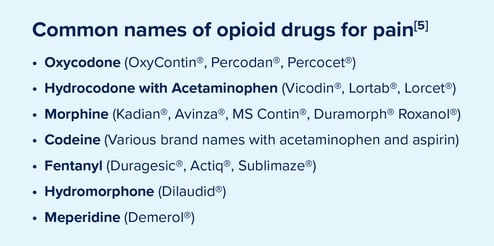How are you feeling on a scale from 0 to 10? That’s a question you hear all the time at the doctor’s office when measuring your pain levels. Throughout your lifetime, you’ve probably experienced a variety of pain ranges. Pain is your body’s way of telling you that something may be wrong and can happen suddenly or gradually overtime. Whether it's temporary pain or a chronic condition, there are many treatment options that can help.
The Aches and Pains of Aging
As you grow older, temporary pains, also known as acute pain, or chronic long-term health issues can become a part of everyday life. Whether you’re chasing the grandkids around, bending down on your knees doing yard work or simply mopping your kitchen, aches and pains can appear at any time. Your immune system can also change over time causing you to heal a little slower and pain to become more frequent.
If you are experiencing pain from a chronic condition, you are not alone. According to the National Council on Aging, 80% of older adults are living with at least one chronic disease, and 68% have at least two.[1] These health challenges often require treatment or pain management to find relief.
Managing Your Pain and Treatment Options
When dealing with pain, many people turn to over-the-counter medications to treat mild to moderate pain, however, sometimes it may require a stronger medication, surgery or other treatment options to find relief. When someone is suffering from painful conditions, the doctor’s main goal is to find an approach to manage the pain with as few side effects as possible. Treatments may include:[2]
- Over-the-counter and prescription medications
- Topical ointments
- Exercises including strength training, yoga, walking and physical therapy
- Interventional therapies including epidural steroid injections or cortisone shots
- Acupuncture
- Massage therapy
- Cognitive behavioral therapy
- Diet and managing weight
- Lifestyle changes such as getting more sleep and avoiding tobacco
Recommendations for managing pain can vary and may even include lifestyle changes. Pain is an individual experience so talk with your doctor and develop a tailored plan for you. There are also pain management resources, such as the Self-Management Resource Center. Your local area agency on aging is another great resource and may offer educational workshops and programs that can help.
Managing Pain Safely
Quite often when the level of pain requires stronger therapy, opioid medications are prescribed to treat moderate to severe pain. While they are meant to help ease symptoms of pain, opioids do come with risks and should be taken only for a short period of time. Many older adults who suffer from chronic conditions are prescribed opioid medication. Understanding the ways to manage your pain safely and effectively is key.
Tips for using opioids safely:[3]
- Keep your medication in a secure place out of reach of children or others
- Never share your medication
- Let your doctor know the other medications you are taking, including over-the-counter drugs, to avoid contraindications and duplication of therapy
- Closely follow the directions your prescriber has provided
- Talk to your doctor about a treatment plan that has you tapering off of opioids to other treatments, such as nonsteroidal anti-inflammatory medications (NSAIDs)
Seek help from your doctor if you experience any of these warning signs:[4]
 Tolerance and needing a higher dose of the medication
Tolerance and needing a higher dose of the medication - Physical dependence on the medication
- Increased sensitivity to pain
- Constipation
- Nausea, vomiting, and dry mouth
- Confusion
- Itching and sweating
- Dizziness and drowsiness
Free Resources
If you or a loved one may have a substance abuse disorder, you can access free information from the U.S. Department of Health and Human Services Substance Abuse and Mental Health Services Administration.
You may access the SAMHSA website at https://www.samhsa.gov/find-help/national-helpline.
For those with Medicare Part B coverage (medical insurance), opioid use disorder treatment programs are covered, including counseling, therapy and periodic assessments both in person and by virtually. You can also visit Medicare.gov/talk-to-someone and select “Opioid Treatment Program Services” to find a program near you.
Medicare Advantage Plans also cover opioid treatment programs. If you’re in a Medicare Advantage Plan, your current opioid treatment program must be Medicare-enrolled to make sure your treatment is covered and stays uninterrupted.
If You Have Pain, Get an Assessment
Remember, pain is your body’s way of telling you something is wrong. If you are experiencing pain that is interfering with your day-to-day activities, call your health care provider and discuss your symptoms. Consistent communication with your doctor and creating a pain management treatment unique to your needs can help alleviate those aches and pains, and most importantly help give you back some much needed relief.
[1] National Council on Aging (2021). Evidence-Based Chronic Disease Self-Management Education Programs. https://www.ncoa.org/article/evidence-based-chronic-disease-self-management-education-programs
[2] Centers for Disease Control and Prevention (CDC) (2021). Safely and Effectively Managing Pain Without Opioids. https://www.cdc.gov/drugoverdose/featured-topics/pain-management.html
[3] Centers for Disease Control and Prevention (CDC) (2020). Prevent Opioid Misuse. https://www.cdc.gov/opioids/patients/prevent-misuse.html
[4] Centers for Disease Control and Prevention (CDC) (2017). Prescription Opioids. https://www.cdc.gov/opioids/basics/prescribed.html
[5] Substance Abuse and Mental Health Services Administration (SAMHSA). Common Names for Prescription Opioid Pain Medications. https://www.mhanet.com/mhaimages/SQI/SUD/SAMHSA%20-%20Common%20Names%20For%20Rx%20Opioid%20Pain%20Medications.pdf
S7694_22-6944_enewsletter 2022_C Reviewed 06/10/22
Elixir Insurance is a Prescription Drug Plan with a Medicare contract. Enrollment in Elixir Insurance depends on contract renewal. For more information, please call our customer service number at 866-250-2005. TTY users call 711. We are available 24 hours a day, 7 days a week. ATTENTION: If you speak Spanish, language assistance services, free of charge, are available to you. Call 866-250-2005 (TTY: 711). ATENCIÓN: si habla Español, los servicios de asistencia lingüística, sin cargo, están disponibles para usted. Llamada 866-250-2005 (TTY: 711).
Elixir Insurance, 8921 Canyon Falls Blvd., Suite 100, Twinsburg, OH 44087, United States


